|
|
|
Sort Order |
|
|
|
Items / Page
|
|
|
|
|
|
|
| Srl | Item |
| 1 |
ID:
093968
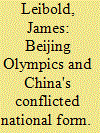

|
|
|
| 2 |
ID:
172245
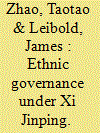

|
|
|
|
|
| Summary/Abstract |
The motto ‘the Party rules everything’ is now a defining characteristic of governance in Xi Jinping’s ‘New Era’. This article analyzes the changing Party-state relationship by interrogating the competition between the Chinese Communist Party’s United Front Work Department and the State Council’s Ethnic Affairs Commission from the early 2000s, focusing particularly on the changes since Xi became leader in 2012. Through discourse analysis, the article documents the gradual yet significant shift in authority from the state to the Party in the institutional structures and ideological praxis of ethnic governance. It argues that the emerging power of the United Front Work Department over ethnic theory, policy and implementation signifies an important shift in ethnic governance through the intensification of integrationist solutions to China’s age-old ‘ethnic question’.
|
|
|
|
|
|
|
|
|
|
|
|
|
|
|
|
| 3 |
ID:
144072
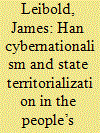

|
|
|
|
|
| Summary/Abstract |
Han majority nationalism poses a significant yet under-theorized challenge to state sovereignty and territorial integrity in China, especially in the era of the Internet. By shifting our focus from minority secessionist movements on the ground in Xinjiang and Tibet to a group of Han nationalists active in cyberspace, this article probes the friction between three distinct yet interrelated ideologies of spatiality in contemporary China: the processes and practices of state territorialization; counter-narratives and geographies of Han cybernationalism; and the transnational flows of the Sinophone Internet. It argues that the Internet empowers yet ultimately blunts the threat of Han nationalism, rendering it largely impotent when faced with the hegemony of state territorialization.
|
|
|
|
|
|
|
|
|
|
|
|
|
|
|
|
| 4 |
ID:
145798
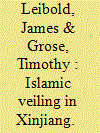

|
|
|
|
|
| Summary/Abstract |
The Islamic veil is arguably the most politicized piece of fabric in the world, eliciting heated debate over its significance and complex meanings. The over 10 million Muslim women in China have their own histories and cultures of veiling. This article explores the ongoing struggle between the Chinese Communist Party and Xinjiang’s Uyghur Muslim minority over the right to define what is “appropriate” and “normal” female adornment. New styles of veiling have entered China from abroad, intensifying the controversy over the scope of Uyghur ethnic attire. We contrast the party-state’s antiveiling campaign to eliminate popular styles in Xinjiang, with the diverse reasons and meanings Uyghur women and men attach to them. While the party-state strives to control and standardize Uyghur dress, the community itself responds, sometimes defiantly, with a complex registry of veiling practices that reflect everything from ethnonational resistance, increased religious faith, and global Islamic haute couture.
|
|
|
|
|
|
|
|
|
|
|
|
|
|
|
|
| 5 |
ID:
100497
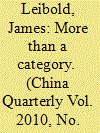

|
|
|
|
|
| Publication |
2010.
|
| Summary/Abstract |
Using the October 2008 slapping incident of historian Yan Chongnian ??? as a case study, this article attempts to contextualize and critically examine the articulation of Han supremacism on the Chinese internet. It demonstrates how an informal group of non-elite, urban youth are mobilizing the ancient Han ethnonym to challenge the Chinese Communist Party's official policy of multiculturalism, while seeking to promote pride and self-identification with the Han race (han minzu ???) to the exclusion of the non-Han minorities. In contrast to most of the Anglophone literature on Chinese nationalism, this article seeks to employ "Han" as a "boundary-spanner," a category that turns our analysis of Chinese national identity formation on its head, side-stepping the "usual suspects" (intellectuals, dissidents and the state itself) and the prominent role of the "foreign other" in Chinese ethnogenesis, and instead probing the unstable plurality of the self/othering process in modern China and the role of the internet in opening up new spaces for non-mainstream identity articulation.
|
|
|
|
|
|
|
|
|
|
|
|
|
|
|
|
| 6 |
ID:
139453
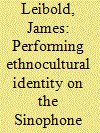

|
|
|
|
|
| Summary/Abstract |
This article explores what happens to the Chinese Party-state’s notion of minzu (nationality, ethnicity or ethno-national identity) in the vastness of cyberspace. The idea that the People’s Republic of China (PRC) comprises 56 distinct yet united minzu groups has encapsulated and circumscribed the performance of ethnocultural diversity in mainland China over the last 60 plus years. In this article, I seek to demonstrate how the Internet helps to loosen the Party-state’s grip on ‘Chineseness’ and its related categories of identity, opening up new spaces for the articulation of a wide range of ethnocultural subject positions that both self-define, mediate and, at times, even transcended minzu-ness. At the same time, however, the fractured and transitory nature of these online congregations renders them largely inconsequential when faced with a powerful and authoritarian Party-state and its robust regime of minzu classification and minzu-based policies inside the PRC.
|
|
|
|
|
|
|
|
|
|
|
|
|
|
|
|
| 7 |
ID:
081923
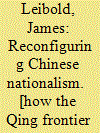

|
|
|
|
|
| Publication |
Hampshire, Palgrave Macmillan, 2007.
|
| Description |
xi, 271p.
|
| Standard Number |
9781403974792
|
|
|
|
|
|
|
|
|
|
|
|
Copies: C:1/I:0,R:0,Q:0
Circulation
| Accession# | Call# | Current Location | Status | Policy | Location |
| 053559 | 305.8951009041/LEI 053559 | Main | On Shelf | General | |
|
|
|
|
| 8 |
ID:
173851
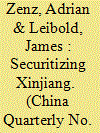

|
|
|
|
|
| Summary/Abstract |
Following a series of high-profile attacks in Beijing, Kunming and Urumqi by Uyghur militants, the Chinese party-state declared a “war on terror” in 2014. Since then, China's Xinjiang region has witnessed an unprecedented build-up of what we describe as a multi-tiered police force, turning it into one of the most heavily policed regions in the world. This article investigates the securitization of Xinjiang through an analysis of official police recruitment documents. Informal police jobs, which represent the backbone of recent recruitment drives, have historically carried inferior pay levels. Yet, advertised assistant police positions in Xinjiang now offer high salaries despite low educational requirements, thereby attracting lesser-educated applicants, many of whom are ethnic minorities. Besides co-opting Uyghurs into policing their own people, the resulting employment is in itself a significant stability maintenance strategy. While the known numbers of violent attacks have subsided, China's heavy-handed securitization approach risks alienating both minority and Han populations.
|
|
|
|
|
|
|
|
|
|
|
|
|
|
|
|
| 9 |
ID:
173934
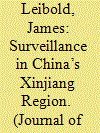

|
|
|
|
|
| Summary/Abstract |
Over the last decade, the Chinese Communist Party has built an unprecedented surveillant assemblage in the Xinjiang Uyghur Autonomous Region (XUAR) with the region’s Uyghur Muslim minority as the chief target of augmented Party-state controls. This article interrogates the mechanics, logic and implications of Xinjiang’s surveillance society. It demonstrates how Party-state monitoring comes not only in the form of physical monitoring and forced kinship but also automated, technology-driven tools such as GPS tracking, voice and facial recognition technologies, machine learning algorithms, and other software and hardware. The Chinese Party-state employs surveillance to delineate ‘correct’ thought and behaviour among its citizens, and then persuade (through coercion and inducement) self-alignment with Party and Han-defined norms. The results are fewer spaces for autonomous, bottom-up social mobilization by the Uyghurs and other minorities, the abolition of non-Han cultural, linguistic and religious practices, and the erosion of social trust in Xinjiang society.
|
|
|
|
|
|
|
|
|
|
|
|
|
|
|
|
| 10 |
ID:
127644


|
|
|
|
|
| Publication |
2014.
|
| Summary/Abstract |
This article turns three different analytical mirrors onto the Xinhai Revolution - 1911, 1961, 2011 - in order to interrogate its evolving significance in the minds of China's Han ethnic and ruling elite. In particular, it seeks to demonstrates the discursive appropriation of the Qing nomadic frontier in the ways in which the 1911 Revolution is remembered and commemorated, exploring both the temporal and spatial dimensions of this appropriation, and how the revolution shifted from a bloody Han racial insurrection against Manchu power and privilege to a heroic celebration of the revival of a multiethnic Chinese nation-state in the face of foreign imperialism and oppression.
|
|
|
|
|
|
|
|
|
|
|
|
|
|
|
|
|
|
|
|
|